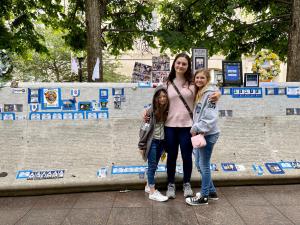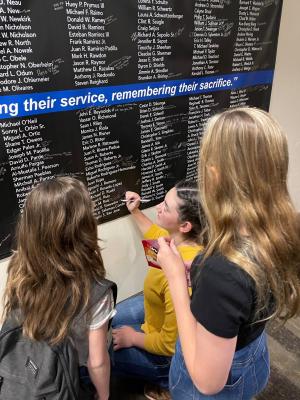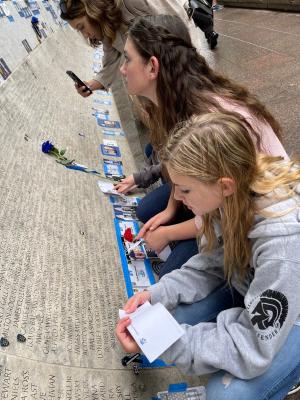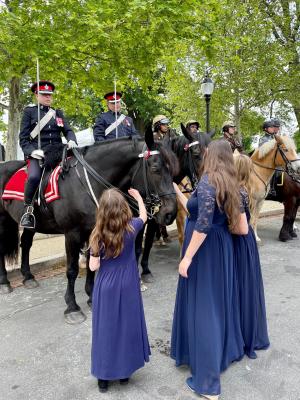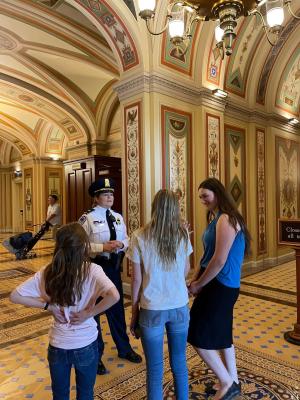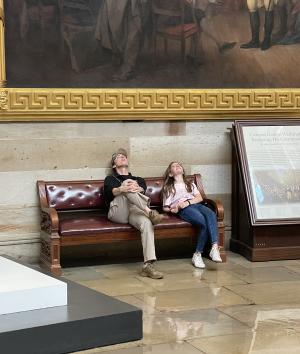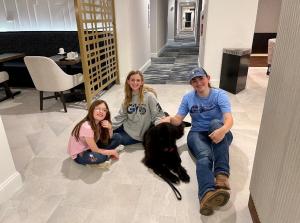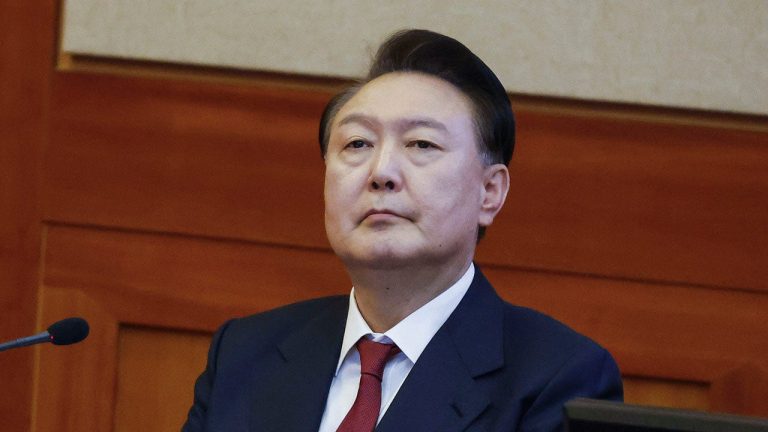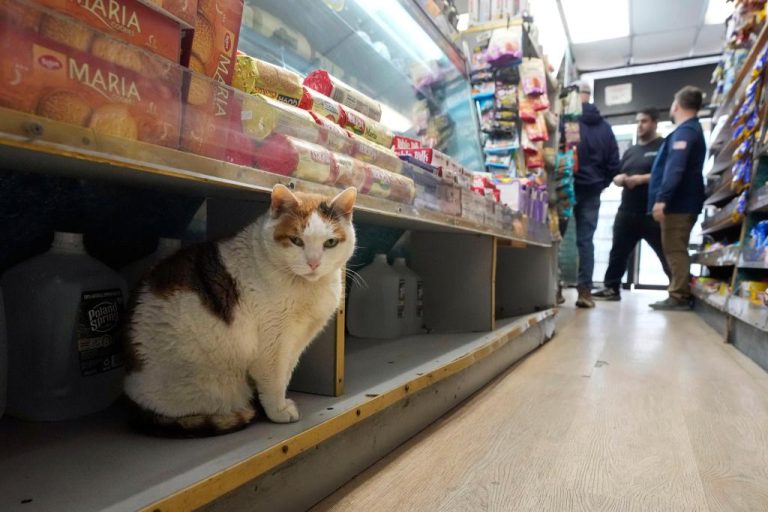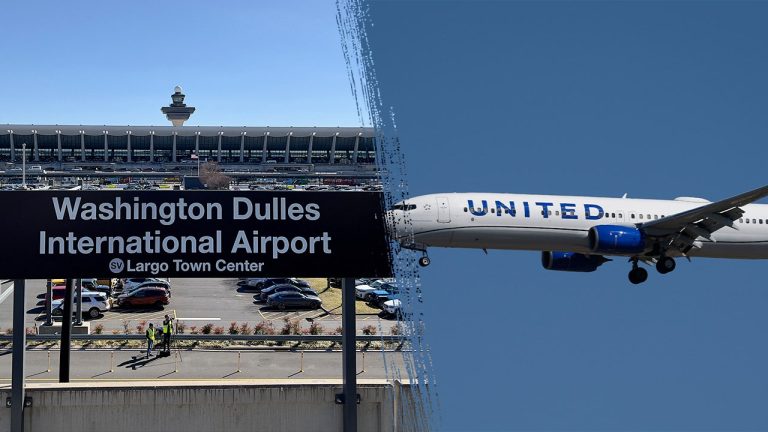
By Marcy Mason
The children of a fallen sheriff’s deputy from La Paz County, Arizona, will never forget an act of kindness from two strangers. U.S. Border Patrol Agent Paul Fisher and his wife, Ashlee, helped them receive a medal to honor their father’s service to the country.
Sergeant Michael Devon Rudd, the children’s father, died on Oct. 11, 2021, when he was accidentally struck by an 18-wheeler truck during the pursuit of a fraud suspect. The following spring, his children—Jasmine, then 15, Kayleen, 13, and MaryAnn, 11—headed to Washington, D.C., for Police Week to pay tribute to their dad. “We didn’t really know what to expect, but our mom decided to take us and we went,” said Jasmine.
It was the family’s first trip to Washington and, with the hordes of people descending upon the city for Police Week, it was overwhelming. “We didn’t know anybody. We got there before our escort officer arrived from Arizona, so we were really on our own that first day,” said Missy Carmack-Reedy, the girls’ mom and Rudd’s former wife. They took a shuttle from the airport to their hotel and when they got there, Carmack-Reedy saw the Fishers sitting at a table, helping people in the crowded lobby. “Paul and Ashlee were the first people we came in contact with,” said Carmack-Reedy. “Almost immediately, they took us under their wing. They asked us, ‘Where do you need to go? What do you need to do? We will help you with anything you need help with.’ They were tremendous and that was just the beginning.”
That night the Fishers took the Rudd girls and their mom to dinner. “They welcomed us into their family,” said Carmack-Reedy. “It was incredible.”
Agent Fisher, a member of CBP’s Survivor Support Team, and his wife Ashlee, a licensed marriage and family therapist who was contracted to help CBP employees and surviving families during Police Week, realized that the children were deeply impacted by the loss of their father and wanted to support them. “We saw them every day that week. We wanted to make sure they had the same type of experience our CBP families would have. That was important to us,” said Ashlee. “Not only did that mean attending the specific Police Week events, but also going into the city and seeing D.C. and doing touristy things. We wanted them to have a time to grieve, but also to make new memories.”
During the week, the Rudd children met other kids who lost their parents. “It was really comforting. Most of my friends at home can’t really understand what the loss of a parent is like because none of them have gone through it, thankfully,” said Jasmine. “It felt a bit lonely. I don’t think any of my friends really knew how to handle it, so there wasn’t much conversation. I think that’s one of the reasons it was nice in D.C. There was a lot of open conversation. People were not afraid to just be honest and be real. It definitely was much needed.”
Her sisters felt the same. “Even though it was really sad that they were in the same position as us, it was really nice to have someone who understands how you feel,” said MaryAnn.
Missing medal
It was brutally hot on the day of the National Peace Officer’s Memorial Service, the main ceremonial event held that week on behalf of the fallen law enforcement officers. Because of COVID, there was an extremely high number of line-of-duty deaths. “The ceremony was long. Over 600 names were read,” said Jasmine. “We were in formalwear and there was no shade. It was full sun and it was hot. It was packed, too, so there was a lot of body heat. There was an old lady in front of us who fainted and she had to get some medical attention.”
When Sergeant Rudd’s name was read, the girls approached a giant wreath where survivors placed white carnations to honor their loved ones. The flower that had been intended for the girls was missing. Then, they walked to a table where medals commemorating the service of those who died were given to surviving family members. The Fraternal Order of Police had created two medals for Sergeant Rudd, one for his widow and the other for his children. “I was wearing a pin that showed that I was supposed to get one of the boxes with a medal for my sisters and me, but it was gone,” said Jasmine. An unauthorized person had taken it.
The girls started to cry. “It literally set my heart on fire. I can’t even explain how heartbroken I felt,” said MaryAnn. “It was our dad and there was no reason for someone to take it away from us,” said Kayleen.
Seated in the audience, Carmack-Reedy watched her children in distress. “As their mother, I felt so helpless and filled with despair. I was angry and I didn’t know what to do. I couldn’t cause a scene in front of all of these people, nor did I want to.” Carmack-Reedy texted Ashlee to let her and Paul know what had happened.
“Missy didn’t ask us to do anything. She just texted that the girls didn’t get their medal and they were devastated,” said Ashlee. “I let our CBP Survivor Support Team know and we sprang into action.”
The Fishers reached out to James Lubs, one of CBP’s two survivor advocates. “Survivor advocates make every effort to ensure that surviving family members are forever part of the CBP family,” said Paul. “CBP’s Survivor Advocate Program was set up so that our families are supported from the day they lose their loved ones into perpetuity.”
Paul, Ashlee and Lubs collectively decided to pursue getting another medal for the girls. Lubs had contacts at the Fraternal Order of Police and reached out to them. “They recognized the difficulties that these children were going through and agreed to create another medal for them. However, this was a rare instance, because they don’t make a lot of special exceptions,” said Lubs. “In fact, I don’t know of another time when they’ve made an exception.”
The girls’ mom was filled with gratitude. “Our week would have been a nightmare without Paul and Ashlee and the CBP family. The hurdles and the stresses that we experienced seemed insurmountable,” said Carmack-Reedy. “They stepped in for my children when I did not know what to do, who to talk to, or how to fix the situation.”
Making happy memories
Throughout the week, Paul and Ashlee fulfilled their promise to take the Rudd children to see and do things in Washington. MaryAnn wanted to go to Crumbs & Whiskers, a cat café in Georgetown. “I love cats. They are my favorite animal in the entire world,” said MaryAnn. “They brought me to the cat café in D.C. and it was really kind and I appreciated it. There were comfy couches and you could just walk around with the cats and pet them. I had a personal favorite, a black cat named Stormy.”
Kayleen wanted to see the White House and the giant Abraham Lincoln statue at the Lincoln Memorial. “I had always read about it and I told Ashlee and Paul, ‘Oh gosh! I really want to go see it,’ and I did,” said Kayleen.
“I’m very interested in politics and law, so I really wanted to see the Supreme Court Building, but there were protests about Roe v. Wade outside and it was getting a little wild,” said Jasmine. So, the group continued walking up the street to the Capitol Building to see if it would be possible to take a tour inside. But the building was closed to the public because of COVID and the January 6 insurrection.
Paul and Ashlee had invited another Border Patrol agent who was part of CBP’s Survivor Support Team to join them that day. Julie Gallagher, a less-lethal instructor at CBP’s Advanced Training Center, was also a surviving family member. Gallagher had lost her brother, a Border Patrol agent, in 2010, when he was struck by a drunk driver during his shift on the Tohono O’odham Nation Reservation in Arizona. “Anytime I see a surviving family, I see my own family in them,” said Gallagher. “So, when I saw the girls, I wanted to help them in any way I could. I see it as a huge privilege to be able to do something to help them and to make their week a little bit better. Jasmine really wanted to see the inside of the Capitol, so it immediately became my mission,” said Gallagher.
Paul and Julie spotted an officer from the Capitol Police near the protesters. They noticed that he had three stars on his collar, an indication that he was someone of high rank. Gallagher didn’t hesitate. She rushed over to tell him the girls were a surviving family in town for Police Week and asked if there was any way they could have a tour of the Capitol. The officer was the acting assistant chief of the Capitol Police and he made the arrangements. “We went practically everywhere inside the Capitol and it was so cool,” said Jasmine. “I also found out about the Senate Page Program, which I am planning to apply for next summer. I didn’t even know there was an opportunity. I am so grateful I learned about that.”
The girls also had a chance to meet Izzy, a black Newfoundland, the first support canine in CBP’s Support K-9 Program, which provides emotional comfort and support for CBP employees, their families, and the communities they live in. Paul and Ashlee had heard that Izzy and her handler, Supervisory CBP Officer Monica Williams, were at Police Week and were going to be providing support for the CBP Honor Guard at one of the local hotels one night. “The girls love animals. It’s a huge thing for them, so we brought them over to meet Izzy,” said Paul. “Four-legged therapists can be the best,” said Ashlee. “They know when someone is hurting inside, and they just sit and listen.”
“She was super big and fluffy and so sweet and cute,” said Jasmine. “She was very comforting, especially because we missed our own dog at home,” said Kayleen.
An act of forgiveness
Shortly after the Rudd girls returned home from Police Week, Jasmine wrote a letter to the truck driver who had accidentally killed her father. “My immediate thought was he’s got to be going through so much as well. Knowing that he had taken someone’s life in an accident, and there was not much he could do had to be horrible,” said Jasmine, who learned through the trucking company’s lawyer that the man had children and grandchildren. “I wanted to let him know that I didn’t want the weight of that to interfere with any of his relationships. What’s done is done. He can’t do anything to bring my dad back, so why should his life be destroyed? I wrote him that the best thing he could do for me is to just continue having those relationships with his kids and grandkids.”
Her youngest sister saw things differently. “At first, I was super upset. I was furious,” said MaryAnn. “But after I understood what happened and thought more about it and what he must be going through, I realized I shouldn’t be so harsh and that maybe it’s time to forgive him. Ashlee and Paul helped me slow my thoughts down and explained a little bit more to where I could understand the different perspectives, and I’m really thankful for that,” said MaryAnn. “I’d probably still have a hard time forgiving the truck driver if it weren’t for them.”
Helping the children came naturally for the Fishers. “In the law enforcement community, we take care of each other across agencies. Everyone at Police Week is there for the same reason. There’s a loss of a family member or a coworker or someone from their agency. And so, we approach every person who is there as an extension of the CBP family, and that includes the girls and their mom. We extended our hand to them,” said Paul.
The medal arrived in October at the Rudd children’s home in Phoenix, almost a year to the day after their father had died. The girls were ecstatic. “I was so grateful. It was like, ‘Wow! It’s actually here!’” said Kayleen. “It truly is amazing that someone would go through all that trouble just to make us happy and to give us something that is so important to us,” said MaryAnn. “I was really surprised that they were so kind to us when we were strangers to them.”
But that all has changed. The families have remained close. The Rudd girls and their mom stopped to see Paul and Ashlee last winter when they were visiting their family in California and MaryAnn is now pen pals with the Fisher’s youngest daughter, Zoe. “Paul and Ashlee started off as total strangers, but they’re pretty much family now,” said Jasmine, who shared that she, her sisters and her mom were returning for Police Week this year. “All of us are so, so, so excited to be able to go back to Police Week to continue building the friendships we’ve made and the healing process.”

